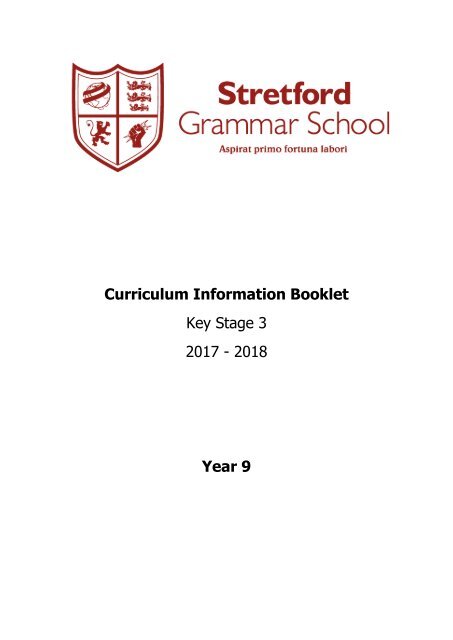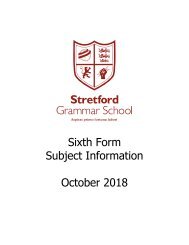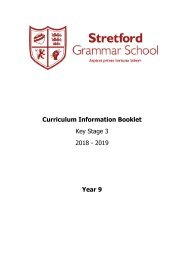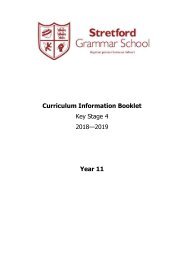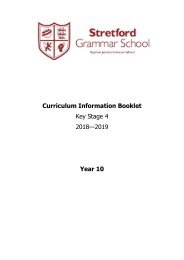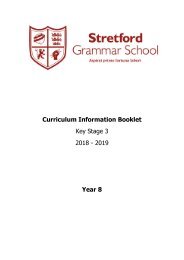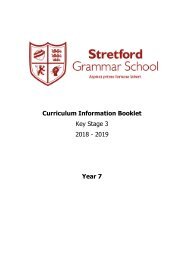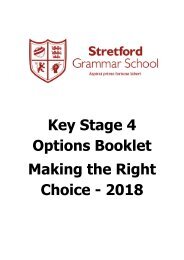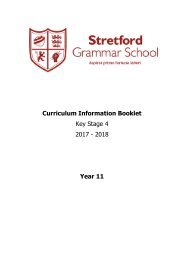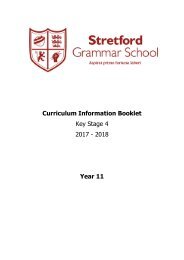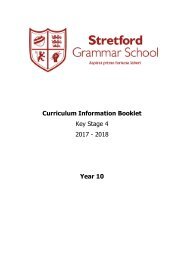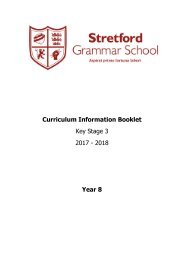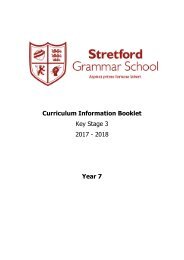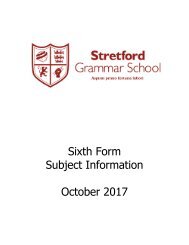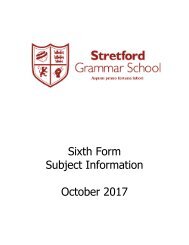Year 9 Curriculum Information Booklet 2017-2018
You also want an ePaper? Increase the reach of your titles
YUMPU automatically turns print PDFs into web optimized ePapers that Google loves.
<strong>Curriculum</strong> <strong>Information</strong> <strong>Booklet</strong><br />
Key Stage 3<br />
<strong>2017</strong> - <strong>2018</strong><br />
<strong>Year</strong> 9
Vision and Values<br />
Aspirat primo fortuna labori<br />
Fortune smiles on our first effort<br />
At the heart of the school’s ethos is the ambition that every student has the<br />
opportunity to experience success. Whether in sport, enrichment or the curriculum,<br />
students will develop their self-confidence and employability through:<br />
a. A school community which is committed to development of staff and students by<br />
embracing leadership opportunities<br />
b. Making maximum progress as a result of consistently high standards of teaching<br />
and learning<br />
c. A curriculum which provides all students with the skills and knowledge to facilitate<br />
a love of lifelong learning and the motivation to realise their potential as active<br />
citizens in an ever changing world<br />
d. Facilities designed and planned to meet the needs of the school community and<br />
provide opportunities to enrich and enhance learning<br />
e. The development of an extended school, working in partnership to meet the<br />
needs of the wider community<br />
Therefore, at Stretford Grammar School we believe:<br />
<br />
<br />
<br />
<br />
<br />
<br />
In the pursuit of academic excellence<br />
In having high expectations of the progress of our students<br />
That we learn best in an environment where success in all its forms is<br />
celebrated and everyone is encouraged to take personal responsibility<br />
That this environment is created through clearly stated expectations of<br />
behaviour with emphasis on discipline and appropriate rewards<br />
That everyone needs to experience success in some aspect of school life to<br />
gain confidence and raise self esteem<br />
That we are all members of a learning community built on mutual respect and<br />
support
Calendar of Events for <strong>Year</strong> 9<br />
8 th November Iceland Meeting<br />
9 th November 7.00 pm – 9.00 pm <strong>Year</strong> 9 <strong>Information</strong> Evening<br />
18 th November PTA Christmas Fair<br />
1 st December – 2 nd December MFL Visit to Christmas Markets<br />
6 th December 7.00 pm Christmas Concert<br />
12 th December SEND Parent Forum<br />
16 th December – 19 th December Visit to Krakow<br />
22 nd December School Closes for Christmas<br />
8 th January School Reopens<br />
1 st February Intermediate Maths Challenge<br />
8 th February Options Evening<br />
9 th – 14 th February Visit to Barcelona<br />
12 th – 16 th February Half Term<br />
21 st February Parents’ Evening<br />
23 rd February Options Forms returned to school<br />
20 th March SEND Forum<br />
29 th March School Closes for Easter<br />
16 th April School Reopens<br />
2 nd May 7.00 pm Spring Concert<br />
28 th May – 1 st June Half Term<br />
18 th June – 22 nd June <strong>Year</strong> 9 Examination Week<br />
19 th June SEND Forum<br />
10 th July Sports Day<br />
12 th July Awards Evening<br />
Week Commencing 16 th July<br />
Active Learning Week – <strong>Year</strong> 9 Camp<br />
19 th July School Closes for the Summer
Assessment and Reporting<br />
The purpose of assessment is to enable an informed judgement to be made about a<br />
student’s knowledge, understanding, skills and attitude. During your child’s academic career<br />
at Stretford Grammar School assessment is a continuous process which is integral to the<br />
teaching and learning cycle. For every subject your child will be assessed at various points<br />
throughout the year and these assessments will be used to inform you about the progress<br />
that your child is making in that subject area.<br />
During each term you will receive a data capture report that contains a working at grade<br />
(WAG), a target to improve sentence and an attitude to learning grade. The WAG indicates<br />
the current level of attainment at the point in time of the report. This grade is based on the<br />
formative assessments that take place during the year.<br />
The WAG reflects the new grading system that has been introduced at GCSE. The 1-9<br />
grading system is used through Key Stage 3 and Key Stage 4. Each grade reflects a set of<br />
skills and knowledge that are specified for each subject area. Below is the expected flight<br />
path of academic progression that your child will be tracked against.<br />
<strong>Year</strong><br />
Group<br />
Progression Flight Path<br />
11<br />
10<br />
9<br />
8<br />
7<br />
Grade 1 2 3 4 5 6 7 8 9<br />
Old Grade G F E D C B A A* A* +<br />
The Working At Grade will reflect whether a student is making progress at a level that is at<br />
the top of a grade skill descriptors (+), making the expected progress within the grade skill<br />
descriptors (=), or making progress that is at the beginning of the grade skill descriptors (-<br />
).<br />
The target to improve sentences will provide your child with specific advice on how to make<br />
further progress. The attitude to learning grade reflects your child’s approach to their<br />
studies.
Assessment should be based on clear, consistent criteria which are known and<br />
understood by both teachers, students and parents/carers, and are guided by<br />
national criteria and statutory requirements where appropriate.<br />
In order to achieve consistency, assessment practice should be subject to effective<br />
moderation and standardising procedures, including regular work scrutinies, learning<br />
walks and departmental Quality Assurance.<br />
A wide range of assessment techniques should be used in different contexts and for<br />
different purposes.<br />
Assessment should provide opportunities for effective differentiation to take place.<br />
Assessment should be supported by a wide range of evidence collected over a period<br />
of time which provides a fair and thorough representation of students' skills,<br />
knowledge and understanding.<br />
Students should be involved in the assessment process so that they are encouraged<br />
to take responsibility for their own learning.<br />
The assessment process should recognise achievement, not just attainment, and<br />
seek to increase students' confidence and motivation.<br />
Assessment should support individuals in identifying strengths and weaknesses,<br />
enabling future learning to be planned through targets to improve, and assisting<br />
them in decision-making.<br />
Assessment practice should be monitored regularly and systematically and<br />
assessment procedures modified if necessary as a result.<br />
The results of assessment should be systematically recorded and used to report to<br />
parents/carers on their children's attainment.
About Our <strong>Curriculum</strong><br />
All students at Stretford Grammar School follow a broad and balanced curriculum. The<br />
curriculum is designed to engage and challenge all students to thrive to achieve their full<br />
potential, both in their studies and in developing as young people equipped to live happy<br />
and fulfilling lives in modern Britain and beyond. We aim to develop confident, considerate<br />
and successful young people, who enjoy and appreciate the value of learning and<br />
citizenship, ready to make a positive contribution to their local communities and to society.<br />
Students’ social, moral, spiritual, cultural and physical development at Stretford Grammar<br />
School is essential to their development as young people. All curriculum areas contribute to<br />
this programme, alongside specialist provision within Religious Education and through the<br />
Personal, Social, Health and Citizenship Education (PSHCE) programme which focusses on<br />
the areas of sex and relationships, careers, health, democracy, the rule of law, individual<br />
liberty and mutual respect and tolerance of those with different faiths and beliefs.<br />
All students in <strong>Year</strong>s 7 to 11 follow the national curriculum which is divided into<br />
<br />
<br />
Core Subjects – English, Mathematics and Science<br />
Foundation Subjects – Art, Geography, History, Computing, Modern Foreign<br />
Languages (French, Spanish), Music, PE, Religious Education, Design Technology and<br />
PSHCE<br />
The majority of subjects in <strong>Year</strong> 9 are taught in mixed ability tutor groups and students are<br />
placed into sets for English and Mathematics.
Art<br />
Art is taught to all students at Stretford Grammar School at Key Stage 3, and the National<br />
<strong>Curriculum</strong> Programme of Study for Art & Design (2014) is used as the basis for curriculum<br />
planning and delivery, as this provides the most recent detailed and applicable content.<br />
Within each Unit, there may be anything from 2-4 individual items of homework set. On<br />
submission, these will be given a mark and summative/formative comments.<br />
Once a Unit is completed, the students are given a Self-Assessment sheet in which they<br />
reflect on their work, and look forward to their future development. These are then<br />
completed by Art staff with assessment and formative comments.<br />
N.B. Apart from the Entry Level Tests in <strong>Year</strong> 7, for all Units of Art work at Key Stage 3<br />
there may be variations in the processes and outcomes involved. The reason for this can be<br />
practical, such as availability of resources and materials, but is more often because the Units<br />
themselves have been designed to be open to individual staff and students’ interpretation<br />
and experimentation. This is the nature of Art.<br />
By <strong>Year</strong> 9, the students have reached a good or higher level of artistic ability. Therefore the<br />
aim for the year is to stretch the students’ skills prior to GCSE. The Units include work that<br />
will allow the students to develop observational work into imaginative or abstract outcomes;<br />
apply lettering design skills to layered printmaking; and combine colour, abstraction and<br />
enlarged banknote details.<br />
Unit 1 – Arcimboldo<br />
Students will study the following within this<br />
Unit:<br />
<br />
<br />
<br />
<br />
Portraits & Self-portraits<br />
Face Proportions<br />
Giuseppe Arcimboldo<br />
Developing Observational work<br />
Possible techniques include:<br />
<br />
<br />
<br />
<br />
Drawing & Painting<br />
Photoshop<br />
Collage<br />
Ceramics<br />
Unit 2 – Graffiti<br />
Students will study the following within this<br />
Unit:<br />
<br />
<br />
<br />
Lettering & Typography<br />
Decorative design work<br />
Relief Printmaking
Reduction Printing<br />
Use of Colour<br />
Possible techniques include:<br />
<br />
<br />
<br />
Painting & Drawing<br />
Felt-tips<br />
Polystyrene Printing<br />
Unit 3 – Optical Art & Banknotes<br />
Students will study the following within this<br />
Unit:<br />
<br />
<br />
<br />
Optical Art; Victor Vasarely, Bridget<br />
Riley<br />
Banknote Design & Features<br />
Lettering & Decorative Elements<br />
Possible techniques include:<br />
<br />
<br />
<br />
Collage<br />
Felt-Tips<br />
Drawing & Painting<br />
Unit 4 – Cubism<br />
Students will study the following:<br />
<br />
<br />
<br />
Cubism including Picasso<br />
Abstract Art<br />
Observational Drawing/Developing<br />
into Abstract work<br />
Possible Techniques include:<br />
<br />
<br />
<br />
Drawing & Painting<br />
Relief work using cardboard<br />
Collage<br />
Additional <strong>Information</strong><br />
Mr. C. Lea – <strong>Curriculum</strong> Leader for Art<br />
art@stretfordgrammar.com
Biology<br />
We start the KS4 course at the start of <strong>Year</strong> 9 in order to allow students the time they will<br />
need to develop their understanding of the synoptic links in Biology and learn how to apply<br />
their knowledge and understanding in novel contexts. Students have an extensive range of<br />
topics to cover and will need time to develop the effective revision strategies needed to<br />
recall the information they will learn.<br />
Biology is taught to all students at Stretford Grammar School. We follow the AQA<br />
specification (Specification code 8461). This is a linear specification and all of the<br />
examinations are taken at the end of <strong>Year</strong> 11.<br />
Aims of the course:<br />
• develop scientific knowledge and conceptual understanding of biology<br />
• develop understanding of the nature, processes and methods of biology through different<br />
types of scientific enquiries that help them to answer scientific questions about the world<br />
around them<br />
• develop and learn to apply observational, practical, modelling, enquiry and problemsolving<br />
skills, both in the laboratory, in the field and in other learning environments<br />
• develop their ability to evaluate claims based on biology through critical analysis of the<br />
methodology, evidence and conclusions, both qualitatively and quantitatively.<br />
The course content covers a majority of concepts key enabling students to understand the<br />
living world around them. The way the biological concepts flow through the course will<br />
enable students to revisit and review concepts helping them to build a deeper<br />
understanding. Lessons require students to read, write and talk about biological concepts as<br />
well as representing concepts through mathematical and visual models. Homework is used<br />
to enable students to consolidate their knowledge and to extend their understanding. The<br />
quality of written communication and the analysis of information are key to success in<br />
biology and lesson or homework activities enable these skills to be developed. Students<br />
develop analytical and practical skills in addition to developing their understanding of how<br />
scientists work in the real world. Practical work is at the heart of biology and is used to<br />
support and consolidate biological concepts (knowledge and understanding). This is<br />
achieved by applying and developing what is known and understood of abstract ideas and<br />
models. Through practical work we are able to make sense of new information and<br />
observations, and provide insights into the development of scientific thinking. Practical work<br />
aims to develop investigative skills. These transferable skills include: devising and<br />
investigating testable questions, identifying and controlling variables, and analysing,<br />
interpreting and evaluating data. Students will learn how to use specialist equipment<br />
correctly to take measurements, handling and manipulate equipment with confidence and<br />
recognise hazards in order to plan how to minimise risk. By focusing on practical work,
students develop the skills of a scientist and learn to master the manipulative skills required<br />
for further study or jobs in STEM subjects. Questions in the written exams will draw on the<br />
knowledge and understanding students have gained by carrying out the practical activities;<br />
these questions will count for at least 15% of the overall marks for the qualification.<br />
As this is a linear course students will be regularly assessed on all the prior concepts they<br />
have covered at the end of every topic.<br />
Topic 1: Cell structure and transport<br />
Students will study the following:<br />
<br />
<br />
<br />
<br />
<br />
<br />
<br />
The uses of microscopes<br />
REQUIRED PRACTICAL: USING A<br />
LIGHT MICROSCOPE<br />
Eukaryotic and Prokaryotic cells<br />
Cell specialisation<br />
Transport into and out of cells<br />
(diffusion, osmosis and active<br />
transport)<br />
REQUIRED PRACTICAL:<br />
INVESTIGATING OSMOSIS<br />
Exchange materials in plants and<br />
animals including anatomy and key<br />
concepts such as surface area to<br />
volume ratios<br />
Topic 2: Cell division<br />
Students will study the following:<br />
<br />
<br />
<br />
<br />
Cell division<br />
Growth and differentiation<br />
Stem cells<br />
Ethical issues regarding Stem cells<br />
Topic 3: Organisation and the<br />
digestive system<br />
Students will study the following:<br />
Tissues and organs<br />
The human digestive system<br />
The chemistry of food<br />
REQUIRED PRACTICAL: FOOD<br />
TESTS<br />
Catalysts and enzymes<br />
REQUIRED PRACTICAL: EFFECT OF<br />
pH ON AMYLASE<br />
Factors affecting enzyme action<br />
How the digestive system works<br />
Making digestion efficient
Topic 4 Organising animals and plants<br />
(part 1)<br />
Students will study the following:<br />
The blood<br />
The blood vessels<br />
The heart<br />
Helping the heart<br />
Breathing and gas exchange<br />
Additional <strong>Information</strong><br />
Mrs. G. Sutton – <strong>Curriculum</strong> Leader for Science / Biology<br />
biology@stretfordgrammar.com<br />
Students select their GCSE options during <strong>Year</strong> 9, ready to begin these at the start of <strong>Year</strong><br />
10. The <strong>Year</strong> 9 Biology course is designed to accommodate those students who decide to<br />
follow the combined science course (worth 2 GCSEs) or the Separate Science course (worth<br />
3 separate GCSEs).
Chemistry<br />
We start the KS4 GCSE course at the start of <strong>Year</strong> 9. Students have an extensive range of<br />
topics to cover over the whole GCSE course and will need time to develop the effective<br />
revision strategies needed to recall the information they will learn and apply it to different<br />
contexts in examination questions. They will also continue to develop their practical skills.<br />
Chemistry is taught to all students at Stretford Grammar School. We follow the AQA<br />
specification (Specification code 8462) and all examinations are sat at the end of <strong>Year</strong> 11.<br />
Topic 1: Metals<br />
Students will study the following:<br />
<br />
<br />
<br />
<br />
<br />
Properties of metals and nonmetals.<br />
Reactions of metals with oxygen,<br />
water, acid and carbonates.<br />
Formulae and equations<br />
Reactivity Series Extraction of<br />
metals linked to reactivity series but<br />
no detail of blast furnace etc.<br />
Corrosion and prevention<br />
Topic 2: Atomic Structure<br />
Students will study the following:<br />
<br />
<br />
<br />
<br />
<br />
Structure of atoms<br />
isotopes,<br />
calculating relative atomic mass<br />
ions<br />
History of the atom<br />
Topic 3: Separating Mixtures<br />
Students will study the following:<br />
<br />
<br />
Filtering, evaporation, distillation,<br />
crystallisation, chromatography and<br />
calculating Rf values<br />
Potable water and waste water<br />
treatment
Additional <strong>Information</strong><br />
Miss S. Hayton – <strong>Curriculum</strong> Leader for Chemistry<br />
chemistry@stretfordgrammar.com<br />
Students select their GCSE options during <strong>Year</strong> 9, ready to begin these at the start of <strong>Year</strong><br />
10. The <strong>Year</strong> 9 Chemistry course is designed to accommodate those students who decide to<br />
follow the combined science course (worth 2 GCSEs) or the Separate Science course (worth<br />
3 separate GCSEs).
Computing<br />
Topic 1<br />
Students will study the following:<br />
<br />
Programming: students will create a<br />
specification for a simple computer<br />
game and write algorithms to<br />
implement their desired features.<br />
Topic 2<br />
Students will study the following:<br />
<br />
Social effects of technology:<br />
students will research and<br />
investigate how computers and<br />
related technologies impact the<br />
world in terms of ethics, the law,<br />
and the environment.<br />
Topic 3<br />
Students will study the following:<br />
<br />
Programming: students will<br />
complete an online course in<br />
JavaScript programming, solving<br />
small problems with code and<br />
developing their logic skills<br />
Topic 4<br />
Students will study the following:<br />
<br />
Theoretical aspects of Computer<br />
Science: students will begin to learn<br />
how computer systems function,<br />
looking at storage and processing<br />
devices, networks, and software.<br />
Topic 5<br />
Students will study the following:<br />
<br />
Organising data: students will<br />
complete a project involving<br />
organising and processing data to<br />
help run an organisation or event.<br />
Additional <strong>Information</strong><br />
Students have opportunities at various points throughout the year to join clubs to build<br />
robots, program games, and develop their logical and strategic thinking skills.<br />
Mr. J. Stenhouse - <strong>Curriculum</strong> Leader for Computer Science<br />
computing@stretfordgrammar.com
Design Technology<br />
Using creativity and imagination, students are encouraged to problem solve within a variety<br />
of contexts and practical skill based areas. They will work with different materials including<br />
woods, plastics and card, acquiring a broad range of subject knowledge and draw on<br />
disciplines such as mathematics, science, engineering, computing and art. In <strong>Year</strong> 9, and<br />
across KS3, students will also study Food and Nutrition, where they will be taught how to<br />
cook a variety of different dishes and apply the principles of nutrition and healthy eating.<br />
Rotation 1 – Materials and<br />
Make: Wood and Plastics<br />
Assessment Points:<br />
A01 – Design<br />
Students will practise and develop skills in CAD CAM,<br />
through the use of 2D design and the laser cutter, to<br />
design and make a mood light inspired by Biomimicry.<br />
They will also have the opportunity to develop a program<br />
for a microcontroller to incorporate a lighting sequence<br />
for their final outcome. Skills and learning covered in this<br />
unit are:<br />
A02 – Make<br />
<br />
<br />
<br />
<br />
<br />
<br />
<br />
Biomimicry in design<br />
Card Modelling<br />
CAD<br />
Use of hand tools for cutting and shaping wood<br />
CAM<br />
Adhesives and joining materials<br />
Programming microcontrollers<br />
Rotation 2 – Food<br />
Preparation and Nutrition:<br />
Experiments in nutrition<br />
Assessment Points:<br />
A02 – Make<br />
A03 – Evaluate<br />
Students will begin to develop higher level skills and<br />
understanding in preparation for potential further study<br />
at GCSE. They will complete 5 practical investigations<br />
over the rotation looking at the function of ingredients in<br />
food along with links to specific dietary needs. Topics<br />
and skills covered are:<br />
<br />
<br />
<br />
<br />
<br />
<br />
<br />
<br />
<br />
<br />
Kitchen health and hygiene<br />
Eat well guide<br />
Proteins<br />
Chilli Con Carne practical<br />
Starch<br />
Meringue and Custard practical<br />
Yeast and raising agents<br />
Chelsea Bun practical<br />
Fats<br />
Pastry Practical – including independent planning.
Rotation 3 – Materials and<br />
Make: Card Engineering<br />
Assessment Points:<br />
A01 – Design<br />
A02 – Evaluate<br />
Students work in small groups to engineer structures out<br />
of card to create a small city scape. They will use both<br />
traditional cutting and folding methods alongside<br />
computer design and manufacture to create a model<br />
world with moving elements. To be successful in this<br />
challenge students have to combine a range of different<br />
elements including the use of smart materials with some<br />
small scale electronics. Topics and skills covered are:<br />
<br />
<br />
<br />
<br />
<br />
<br />
<br />
Industrial practices<br />
Nets<br />
Card engineering<br />
CAD<br />
CAM<br />
Smart materials<br />
Electronic circuits<br />
Additional <strong>Information</strong><br />
There will be a small cost to some rotation areas over the year in order to support the<br />
department to provide practical materials for design and make based projects. Parents/<br />
carers will be always be fully informed in advance and in writing by the department, and<br />
support is available for any students with any financial concerns.<br />
Mrs. H. Barry – <strong>Curriculum</strong> Leader for Design Technology<br />
design@stretfordgrammar.com
English<br />
English is taught to all students in <strong>Year</strong> 9. All classes will have a dedicated teacher.<br />
Students complete the same curriculum, but units 2, 3 and 4 are taught on a ‘carousel’<br />
basis, so students may not be studying the same unit at the same time. Much of the work<br />
in <strong>Year</strong> 9 centres on the study of whole literature texts in preparation for the demands of<br />
GCSE English Literature; units 1 and 5 focus on English Language GCSE preparation and<br />
skills.<br />
Unit 1 – Travel Writing<br />
Students will read a number of extracts of<br />
literary non-fiction by writers such as Misha<br />
Glenny and Bill Bryson, in order to develop<br />
their non-fiction writing skills. They will<br />
practise, develop and revise the following<br />
skills:<br />
<br />
<br />
<br />
<br />
Conscious crafting of structure,<br />
content and style<br />
Generating plausible and<br />
imaginative content<br />
Writing about how writers use<br />
language and structure to create<br />
effects<br />
Adapting writing and content for<br />
different genres<br />
Assessment: Non-fiction travel writing<br />
Unit 2 – Animal Farm<br />
Students will read George Orwell’s novel,<br />
Animal Farm in its entirety and will<br />
complete full class notes about character,<br />
setting, context and theme. They will<br />
practise, develop and revise the following<br />
skills:<br />
<br />
<br />
<br />
<br />
Note-taking and annotation<br />
Using notes to help prepare and<br />
plan academic essays<br />
Making links to wider contextual<br />
knowledge from other texts and<br />
times<br />
Working in timed conditions
Assessment: Formal analytical essay of<br />
character and context<br />
Unit 3 – Heroes<br />
Students will read Robert Cormier’s novel,<br />
Heroes in its entirety and will complete full<br />
class notes about character, setting,<br />
context and theme. They will practise,<br />
develop and revise the following skills:<br />
<br />
<br />
<br />
<br />
The use of literary terminology to<br />
improve analytical writing<br />
Understanding of how authors use<br />
language to create ‘shades’ in<br />
character in particular<br />
Note-taking and planning skills<br />
Formal essay writing<br />
Assessment: Formal analytical essay of<br />
character and theme<br />
Unit 4 – Julius Caesar<br />
Students will read and watch Shakespeare’s<br />
Julius Caesar in its entirety and form a clear<br />
understanding of the plot, characters and<br />
context. They will practise, develop and<br />
revise the following skills:<br />
<br />
<br />
<br />
<br />
<br />
Understanding the structure and<br />
content of a Shakespearean play<br />
Engaging with Shakespearean<br />
language and being able to write<br />
about it analytically<br />
The importance of form in literary<br />
analysis<br />
Note-taking, annotation and<br />
planning skills<br />
Writing about extracts of text in<br />
close detail and linking to the wider<br />
text<br />
Assessment: Formal analytical essay of an<br />
extract
Unit 5 – Introduction to English<br />
Language GCSE<br />
Students will read a range of non-fiction<br />
texts from the 19 th century to the present<br />
day. They will practise, develop and revise<br />
the following skills:<br />
<br />
<br />
<br />
<br />
<br />
A consolidation of their<br />
understanding of writers’ techniques<br />
The ability to compare texts on<br />
similar themes and topics<br />
Understanding complex texts<br />
through careful reading, information<br />
retrieval and contextualisation<br />
Writing in timed conditions and to<br />
clear assessment objectives<br />
Writing to express a point of view<br />
using a range of techniques<br />
Assessment: There will be a <strong>Year</strong> 9 exam at<br />
the end of this unit, which will comprise a<br />
GCSE style English Language paper as well<br />
as a GCSE style English Literature paper,<br />
for which students will need to revise their<br />
work from Units 2, 3 and 4.<br />
Unit 6 – Poetry<br />
Students will read for the first time and<br />
revise / re-read a number of poems from<br />
the 19 th century to the present day. They<br />
will practise, develop and revise the<br />
following skills:<br />
<br />
<br />
<br />
<br />
Comparing poems, including<br />
analysis of language, structure and<br />
style of both ‘prepared’ and ‘unseen’<br />
poems<br />
Applying a knowledge of context to<br />
a range of different poems, themes<br />
and ideas<br />
The ability to annotate, note-take<br />
and organise ideas<br />
Planning and structuring formal<br />
analytical essays<br />
Assessment: There is no formal assessment<br />
of this scheme, but students will prepare<br />
analytical and comparative pieces as part of
the scheme of work<br />
Additional <strong>Information</strong><br />
Students will be given a novel for private reading in the first term of <strong>Year</strong> 9. There will be<br />
independent homework tasks allocated on a weekly basis to monitor and assess the<br />
progress of this reading.<br />
Independent reading of fiction, non-fiction, newspapers and magazines, as well as watching<br />
documentaries and listening to talk radio become critical activities at this stage in a student’s<br />
development. As they progress towards GCSE they need to be well-informed and interested<br />
individuals who are conscious and aware of the wider world.<br />
Ms L. Yeomans – <strong>Curriculum</strong> Leader for English<br />
english@stretfordgrammar.com
Geography<br />
Geography is taught to all students at Stretford Grammar School and involves the studying<br />
of a range of Physical and Human Geography topics. There is a focus on specific regions<br />
such as the Middle East, Southern and Eastern Asia. Students will also complete a range of<br />
literacy and numeracy skills including extended writing and graphical techniques. Lessons<br />
will be a mixture of discussion, independent work, enquiry and ICT skills.<br />
Unit 1 - National Parks and Limestone<br />
Students will study the following:<br />
<br />
<br />
<br />
<br />
<br />
The nature of the national parks and<br />
what makes them special<br />
rocks and soils in the Peak District<br />
national park<br />
map skills in Castleton<br />
fieldwork assessment: enquiry into<br />
tourism in Castleton village<br />
limestone<br />
Unit 2 – Earthquakes and Volcanoes<br />
Students will study the following:<br />
<br />
<br />
<br />
<br />
<br />
<br />
<br />
the structure of the earth<br />
the tectonic plates and reasons for<br />
plate movements<br />
the types of plate boundary<br />
volcanoes<br />
composite and shield volcanoes<br />
earthquakes<br />
assessment: Why did so many<br />
people die in the Japanese tsunami?<br />
Unit 3 – Who wants to be a billionaire? Students will study the following:<br />
<br />
<br />
<br />
<br />
<br />
<br />
<br />
causes of inequality<br />
measuring inequality<br />
oil wealth in the Middle East<br />
globalisation in Asia<br />
the positives and negatives of<br />
globalisation<br />
measuring happiness<br />
hi-tech industries
Unit 4 – GCSE Unit 1: The Challenge of<br />
Resource Management<br />
Students will study the following:<br />
<br />
<br />
<br />
<br />
<br />
<br />
<br />
<br />
why water, energy and food<br />
resources are so important to our<br />
economic well being<br />
organic food, agribusiness, food<br />
miles and the growth of nonseasonal<br />
products<br />
water supply and demand in the UK<br />
water transfer schemes in the UK<br />
pollution of water courses and<br />
management of this pollution<br />
energy in the UK – current sources<br />
of energy<br />
issues concerning energy security<br />
the future of energy use in the UK<br />
and the move to renewables<br />
Additional <strong>Information</strong><br />
The end of year exam will be a GCSE exam question on the Challenge of Resource<br />
Management, and will also involve some GCSE style questions related to fieldwork. It will be<br />
a mixture of multiple choice, short answer questions and extended responses.<br />
As part of our National parks unit, the whole year group attends a trip to Castleton to collect<br />
data as part of their fieldwork assessment. The trip involves data collection in the town itself<br />
and a trip down Treak Cliff Cavern to learn about limestone.<br />
Miss E. Eeles<br />
geography@stretfordgrammar.com
History<br />
The principal aim of the History and Politics Department is to encourage interest in, and<br />
enjoyment of, the past and to understand how it impacts on the present and the future.<br />
Students should be inspired and stimulated by the teaching they receive and they will be<br />
encouraged to widen their historical knowledge and develop skills which will serve them not<br />
only in History and Politics but in other subject areas.<br />
The Department believes that students should be encouraged to think for themselves and<br />
become inquisitive and critical citizens of the future. Students explore relevant questions<br />
which will show the importance of the past.<br />
The students in <strong>Year</strong> 9 also begin the GCSE course in January: Units 3 - 5.<br />
Unit 1:<br />
Commonwealth: the impact of War<br />
and conflict. WW1<br />
<br />
<br />
<br />
<br />
<br />
What were the causes and course of<br />
WW1?<br />
What was life like in the trenches?<br />
Do the benefits of war ever outweigh the<br />
negatives?<br />
Why did the anti-Immigration riots break<br />
out in 1919?<br />
What were the contributions made by<br />
migrants during WW1?<br />
Unit 2:<br />
Commonwealth: the impact of War<br />
and conflict. WW2<br />
<br />
<br />
<br />
<br />
<br />
<br />
The rise of extremes.<br />
What was life like for people living under<br />
Nazi Rule?<br />
What was life like in England during<br />
WW2?<br />
What were the contributions made by<br />
migrants during WW2?<br />
How were refugees treated during WW2?<br />
How and why were the Jews persecuted<br />
by the Nazis?<br />
Unit 3:<br />
American people and the 'Boom'<br />
<br />
<br />
<br />
The ‘Boom’: benefits, and inequalities of<br />
wealth; Republican government policies;<br />
stock market boom.<br />
Social and cultural developments:<br />
entertainment, cinema and jazz and<br />
flappers.<br />
Divided society: organised crime,<br />
prohibition, racial tension, immigration,<br />
the Ku Klux Klan; the Red Scare and the<br />
significance of the Sacco and Vanzetti<br />
case.
Unit 4:<br />
Bust – Americans' experiences of the<br />
Depression and New Deal<br />
<br />
<br />
<br />
American society during the Depression:<br />
unemployment; farmers; businessmen;<br />
Hoover’s responses and unpopularity;<br />
Roosevelt's election as president.<br />
The effectiveness of the New Deal on<br />
different groups in society: successes and<br />
opposition towards the New Deal.<br />
The impact of the Second World War:<br />
America’s economic recovery; Lend Lease;<br />
exports; social developments, including<br />
experiences of African-Americans and<br />
women.<br />
Unit 5:<br />
USA: Post-war America<br />
<br />
<br />
<br />
Post-war American society and economy:<br />
consumerism and the causes of<br />
prosperity; the American Dream;<br />
McCarthyism; popular culture, Rock and<br />
Roll and television.<br />
Racial tension and developments in the<br />
Civil Rights campaigns in the 1950s and<br />
1960s: Segregation laws; Martin Luther<br />
King and peaceful protests; Malcolm X and<br />
the Black Power Movement; Civil Rights<br />
Acts of 1964 and 1968.<br />
America and the ‘Great Society': the social<br />
policies of Presidents Kennedy and<br />
Johnson relating to poverty, education<br />
and health; the development and impact<br />
of feminist movements in the 1960s and<br />
early 1970s, including the fight for equal<br />
pay; the National Organisation for<br />
Women, Roe v Wade (1973), the Supreme<br />
Court ruling on equal rights (1972) and<br />
opposition to Equal Rights Amendment.<br />
Additional <strong>Information</strong><br />
Opportunities are available to take part in debate club on Fridays. Homework support is<br />
also available at lunch times and after school. An educational visit to Krakow and<br />
Battlefields is also planned for all students to support their field study in History.<br />
Mrs. H. Conlin – <strong>Curriculum</strong> Leader for History and Politics<br />
history@stretfordgrammar.com
Mathematics<br />
Maths is taught to all students at Stretford Grammar School, following the National<br />
<strong>Curriculum</strong> for Mathematics. Setting is reviewed at the end of <strong>Year</strong> 8 and students continue<br />
at one of three levels: Accelerated, Challenge (parallel sets) and Support. The main content<br />
of the topics covered is the same for all sets.<br />
Unit 1 – Algebra<br />
Students will study the following:<br />
<br />
<br />
<br />
Further work with straight line<br />
graphs, including parallel and<br />
perpendicular lines<br />
Simple coordinate geometry: length<br />
and mid-point of a line segment<br />
Plot and recognise graphs of nonlinear<br />
functions<br />
Unit 2 – Number<br />
Students will study the following:<br />
<br />
<br />
<br />
Further problems with fractions,<br />
ratios and percentages<br />
Compound percentage change<br />
Recurring decimals: conversion to<br />
an equivalent fraction<br />
Unit 3 – Shape<br />
Students will study the following:<br />
<br />
<br />
Further combination of<br />
transformations<br />
Recognise and use similarity and<br />
congruence in shapes<br />
Unit 4 – Number<br />
Students will study the following:<br />
<br />
<br />
<br />
Powers and roots<br />
Laws of indices<br />
Calculations with numbers in<br />
standard form<br />
Unit 5 – Algebra<br />
Students will study the following:<br />
<br />
<br />
<br />
Further linear equations<br />
Solution of simultaneous equations<br />
using algebraic or graphical<br />
methods<br />
Solution of inequalities in one or two
variables<br />
Regions defined by inequalities<br />
Unit 6 – Data<br />
Students will study the following:<br />
<br />
<br />
<br />
<br />
<br />
Further use of statistical diagrams<br />
Cumulative frequency graphs<br />
Quartiles and interquartile range<br />
Box plots<br />
Using diagrams, averages and<br />
spread to compare data distributions<br />
Unit 7 – Algebra<br />
Students will study the following:<br />
<br />
<br />
<br />
<br />
Further manipulation<br />
Expand and factorise quadratic<br />
expressions<br />
Solve quadratic equations<br />
Rearrange more complicated<br />
formulae<br />
Unit 8 – Shape<br />
Students will study the following:<br />
<br />
<br />
<br />
Further use of Pythagoras’ theorem,<br />
including problems in 3D<br />
Trigonometry to find sides or angles<br />
Graphs of the Sine, Cosine and<br />
Tangent functions<br />
Unit 9 – Probability<br />
Students will study the following:<br />
<br />
<br />
Further calculation of probability,<br />
including conditional and<br />
independent events<br />
Draw and use a tree diagram<br />
Unit 10 – Number<br />
Students will study the following:<br />
<br />
<br />
Solve further problems involving<br />
ratio and proportion<br />
Find and use upper and lower<br />
bounds for a number that has been<br />
approximated<br />
Unit 10 – Shape<br />
Students will study the following:<br />
<br />
Further use of angle properties,<br />
including proof
Construction of more complicated<br />
loci and using them to solve<br />
problems<br />
Unit 12 – Algebra<br />
Students will study the following:<br />
<br />
<br />
Rules for non-linear sequences,<br />
including fractional and quadratic<br />
sequences<br />
Combine more complicated<br />
functions and find inverses<br />
Unit 13 – Shape<br />
Students will study the following:<br />
<br />
Solving more demanding problems<br />
involving area and volume<br />
Unit 14 - Algebra<br />
Students will study the following:<br />
<br />
Further work with quadratic<br />
functions and equations, including<br />
completing the square and the use<br />
of the quadratic formula<br />
Unit 15 – Shape<br />
Students will study the following:<br />
<br />
Angle properties of circles<br />
Unit 16 – Set Theory<br />
Students will study the following:<br />
<br />
<br />
Set notation<br />
Drawing and using two-way tables<br />
and Venn diagrams to solve logic<br />
problems<br />
Additional <strong>Information</strong><br />
Students in the Accelerated set have the opportunity to participate in the UK Intermediate<br />
Maths Challenge. Selection for this takes place in the Spring Term.<br />
Mr. C. McAvoy – <strong>Curriculum</strong> Leader for Mathematics<br />
maths@stretfordgrammar.com
Modern Foreign Languages – French<br />
French is taught to half the year group at Stretford Grammar School and in <strong>Year</strong> 9 students<br />
follow the scheme of work set in the Studio 2 digital resource. <strong>Year</strong> 9 is the perfect time to<br />
inspire language learning to build a strong springboard for their future learning of French.<br />
Students start their GCSE course at the beginning of Y9, with a strong focus on developing<br />
the four key skill areas of listening, speaking, reading and writing.<br />
Unit 1 –Qui suis- je?<br />
Students will learn how to talk about themselves in<br />
further detail and it will cover the following:<br />
<br />
<br />
<br />
<br />
<br />
<br />
<br />
<br />
<br />
<br />
<br />
<br />
<br />
<br />
Family and describing people<br />
Revising places in town and activities<br />
Talking about friends and what makes a<br />
good friend<br />
Using irregular verbs in the present<br />
tense.<br />
Talking about family relationships<br />
Using reflexive verbs in the present<br />
tense<br />
Making arrangements to go out<br />
Using the near future tense<br />
Describing a night out with friends<br />
Using the perfect tense<br />
Talking about your life when you were<br />
younger<br />
Using the imperfect tense<br />
Discussing role models<br />
Using the present, perfect and imperfect<br />
tenses together.<br />
Unit 2 –Le temps de loisirs<br />
Students will learn all about their free time in more<br />
depth and this unit will cover:<br />
<br />
<br />
<br />
<br />
<br />
<br />
<br />
<br />
<br />
Revising sport and music<br />
Revising technology, films and TV<br />
Talking about sport<br />
Using depuis + the present tense<br />
Talking about your life online<br />
Using comparatives<br />
Talking about books and reading<br />
More practice of the imperfect tense<br />
Talking about television programmes
Using direct object pronouns<br />
Talking about actors and films<br />
Using superlatives and adjectives<br />
Unit 3 – Jours ordinaires, jours de fête<br />
Students will learn to talk about celebrations and<br />
festivals in French. This unit will cover:<br />
<br />
<br />
<br />
<br />
<br />
<br />
<br />
<br />
<br />
<br />
<br />
<br />
Talking about food and meals<br />
Discussing and shopping for clothes<br />
Describing your daily life<br />
Using devoir and pouvoir<br />
Talking about food for special occasions<br />
Using the pronoun en<br />
Using polite language<br />
Asking questions in the tu and vous forms<br />
Describing family celebrations<br />
Using venir de + infinitive<br />
Describing festivals and traditions<br />
Using a combination of tenses.<br />
Additional <strong>Information</strong><br />
Students will learn about the culture from a variety of different Francophone countries. They<br />
will have a strong grammatical understanding and they will always be encouraged to use<br />
French spontaneously in the classroom.<br />
There will be a number of extra- curricular trips available to the following places in <strong>2017</strong> –<br />
<strong>2018</strong>:<br />
1. Festive Fun in France!<br />
2. ¡Viva Barça!<br />
3. Discover more in Brittany.<br />
Miss C. Ashall – <strong>Curriculum</strong> Leader for Modern Foreign Languages<br />
mfl@stretfordgrammar.co
Modern Foreign Languages – Spanish<br />
Spanish is taught to half the year group at Stretford Grammar School and in <strong>Year</strong> 8 students<br />
follow the scheme of work set in the ¡Viva! digital resource. <strong>Year</strong> 9 is the perfect time to<br />
inspire language learning to build a strong springboard for their future learning of Spanish.<br />
Students start their GCSE course at the beginning of Y9, with a strong focus on developing<br />
the four key skill areas of listening, speaking, reading and writing.<br />
Unit 1 –¡Desconéctate!<br />
Students will learn how to talk about the following<br />
aspects of their holidays:<br />
<br />
<br />
<br />
<br />
<br />
<br />
<br />
<br />
<br />
<br />
<br />
<br />
<br />
<br />
<br />
<br />
<br />
<br />
<br />
<br />
Discussing holidays and weather<br />
Revising the present and the preterite<br />
tenses<br />
Saying what you do in the summer<br />
Using the present tense<br />
Listening to identify the person of the<br />
verb<br />
Talking about holiday preferences<br />
Using verbs of opinion to refer to<br />
different people<br />
Understanding percentages<br />
Saying what you did on holiday<br />
Using the preterite tense<br />
Using different structures to give<br />
opinions<br />
Describing where you stayed<br />
Using the imperfect tense<br />
Working out the meaning of new words<br />
Booking accommodation and dealing<br />
with problems<br />
Using verbs with usted<br />
Using questions to form answers<br />
Giving an account of a holiday in the<br />
past<br />
Using three tenses together<br />
Identifying positive and negative<br />
opinions<br />
Unit 2 –Mi vida en el insti<br />
Students will learn to talk about their school lives in<br />
Spanish:<br />
<br />
<br />
Giving opinions about school subjects<br />
Describing school facilities
Describing school uniform and the school<br />
day<br />
Using adjectives<br />
Talking about subjects and teachers<br />
Using comparatives and superlatives<br />
Describing your school<br />
Using negatives<br />
Comparing now and then<br />
Talking about school rules and problems<br />
Using phrases followed by the infinitive<br />
Tackling harder listening exercises<br />
Talking about plans for a school exchange<br />
Using the near future tense<br />
Asking and answering questions<br />
Talking about activities and achievements<br />
Using object pronouns<br />
Saying how long you have been doing<br />
something<br />
Unit 3 – Mi gente<br />
Students will learn to talk about people in their<br />
lives:<br />
<br />
<br />
<br />
<br />
<br />
<br />
<br />
<br />
<br />
<br />
<br />
<br />
<br />
<br />
<br />
<br />
<br />
<br />
Talking about socialising and family<br />
Using verbs in the present tense<br />
Describing people<br />
Using adjectival agreement<br />
Talking about social networks<br />
Using para with infinitives<br />
Extending responses by referring to others<br />
Making arrangement to go out<br />
Using the present continuous tense<br />
Improvising dialogues<br />
Talking about reading preferences<br />
Using a range of connectives<br />
Recognising similar ideas expressed<br />
differently<br />
Describing people<br />
Using ser and estar<br />
Talking about friends and family<br />
Using a range of relationship verbs<br />
Referring to the present and the past.<br />
Additional <strong>Information</strong><br />
Students will learn about the culture from a variety of different Hispanic countries. They will<br />
have a strong grammatical understanding and they will always be encouraged to use<br />
Spanish spontaneously in the classroom.
There will be a number of extra- curricular trips available to the following places in <strong>2017</strong> –<br />
<strong>2018</strong>:<br />
1. Festive Fun in France!<br />
2. ¡Viva Barça!<br />
3. Discover more in Brittany.<br />
Miss C. Ashall – <strong>Curriculum</strong> Leader for Modern Foreign Languages<br />
mfl@stretfordgrammar.com
Music<br />
Music is taught to all students at Stretford Grammar School and the aim is to ensure all<br />
students can read Musical notation of various forms, compose and perform in different<br />
styles and be able to identify key features of different Musical Genres by the end of <strong>Year</strong> 9<br />
in order to prepare them for KS4. Lessons are mainly practical with an opportunity to work<br />
alone, in pairs and in larger groups for half termly assessments. Some lessons will include<br />
some written, listening and brief analysis and written work. There are always a wide variety<br />
of extension tasks for those students who already play an instrument and read Music so<br />
they have the same level of challenge as someone in the class who is new to the subject. At<br />
the end of <strong>Year</strong> 9, 4 skills are tested – Performing, Composing, Appraising and Listening.<br />
Unit 1 -Reggae Music<br />
Students will study the following:<br />
<br />
<br />
<br />
<br />
Baseline assessment to find out<br />
prior knowledge which includes<br />
written, listening and practical<br />
activities.<br />
Introduce Reggae Music and look at<br />
the origins and development from<br />
Blues Music.<br />
Build up to a progressive<br />
composition by writing chord<br />
sequences, riffs and melodies and<br />
eventually putting together Reggae<br />
songs in groups to perform.<br />
Assessment and evaluation of the<br />
work completed.<br />
Unit 2 – Pop Music<br />
Students will study the following:<br />
<br />
<br />
<br />
<br />
<br />
Pop Music from the 1960s and why<br />
the Beatles were so famous.<br />
Using prior knowledge to put<br />
together a well-known Beatles song.<br />
Using a 70s Pop Song and they have<br />
to add in chords, accompaniments<br />
etc. to make it typical of the era.<br />
Music technology used to look at<br />
Dance Music and putting together<br />
samples and loops within a Pop<br />
Song structure.<br />
Cover versions of a Pop Song of the<br />
student’s choice.
Unit 3 – Film Music<br />
Students will study the following:<br />
<br />
<br />
<br />
<br />
<br />
<br />
History of Film Music and how the<br />
role of Music has changed in films.<br />
Film genres and how instruments<br />
are used.<br />
Performance of film themes.<br />
Sound effects.<br />
Writing film Music and sound effects<br />
for a film clip and perform live for<br />
the class.<br />
Group assessments and<br />
performances.<br />
Unit 4 – Variations<br />
Students will study the following:<br />
<br />
<br />
<br />
<br />
Musical structures and Variation<br />
form.<br />
Developing listening skills and the<br />
ability to identify changes.<br />
Variation techniques are studied<br />
before students compose Variations<br />
on well-known melodies.<br />
Performance and assessment of<br />
compositions.<br />
Unit 5 – Minimalism<br />
Students will study the following:<br />
The features and techniques used in<br />
Minimalist Music.<br />
Perform unusual pieces in a<br />
Minimalist style.<br />
The techniques to create ostinato<br />
patterns anddevelop into a longer<br />
composition.<br />
Music is written for a purpose /<br />
occasion in preparation for KS4.<br />
Group assessments and<br />
performance.
Unit 6 – Exams and projects.<br />
Students will study the following:<br />
<br />
<br />
<br />
Detailed revision of all of the main<br />
topics taught since <strong>Year</strong> 7.<br />
Exams to include – written,<br />
listening, composing and<br />
performing.<br />
Individual projects to include M.T,<br />
performance work, composition,<br />
planning an event etc.<br />
Additional <strong>Information</strong><br />
Opportunities are available to have instrument lessons for 20 minutes or more with a<br />
specialist instrument teacher and all students are encouraged to become involved at least<br />
one of the many extra-curricular clubs on offer.<br />
Mrs. K. Swales – <strong>Curriculum</strong> Leader for Music<br />
music@stretfordgrammar.com
Physical Education<br />
PE is an integral element of the curriculum and accessible to all students. Students<br />
undertake four hours of PE over the two week timetable cycle.<br />
Boys – Term 1<br />
Students will undertake the following key<br />
elements:<br />
<br />
<br />
<br />
<br />
<br />
Fitness<br />
Football<br />
Cross Country<br />
Gym<br />
Rugby Union<br />
Girls – Term 1<br />
Students will undertake the following key<br />
elements:<br />
<br />
<br />
<br />
<br />
Netball<br />
Fitness<br />
Cross Country<br />
Gym<br />
Boys – Term 2<br />
Students will study the following key<br />
elements:<br />
<br />
<br />
<br />
<br />
Rugby Union<br />
Rugby League<br />
Basketball<br />
Hockey<br />
Girls – Term 2<br />
Students will study the following key<br />
elements:<br />
<br />
<br />
<br />
<br />
<br />
<br />
Dance<br />
Rugby<br />
Netball<br />
Football<br />
Hockey<br />
Basketball
Boys – Term 3<br />
Students will study the following key<br />
elements:<br />
<br />
<br />
<br />
<br />
Handball<br />
Athletics<br />
Tennis<br />
Cricket<br />
Girls – Term 3<br />
Students will study the following key<br />
elements:<br />
<br />
<br />
<br />
Athletics<br />
Tennis<br />
Rounders<br />
Additional <strong>Information</strong><br />
Opportunities are provided for students to undertake sports outside of the timetabled<br />
curriculum.<br />
Mr. S. Hodgson – <strong>Curriculum</strong> Leader for PE<br />
sport@stretfordgrammar.com
Physics<br />
We start the KS4 GCSE course at the start of <strong>Year</strong> 9. Students have an extensive range of<br />
topics to cover over the whole GCSE course and will need time to develop the effective<br />
revision strategies needed to recall the information they will learn.<br />
Physics is taught to all students at Stretford Grammar School. We follow the AQA<br />
specification (Specification code 8463).<br />
Outline of the Course<br />
Unit 1 – Physics Key<br />
Processes<br />
Students start the GCSE Energy topic in <strong>Year</strong> 9. Practical<br />
work will also be at the heart of these topics and students<br />
practical skills will be assessed in the examination papers<br />
at the end of <strong>Year</strong> 11.<br />
The Energy topic is separated into the following sections:<br />
1. Energy changes and transfers and efficiency:<br />
Energy stores and transfers<br />
Conservation energy,<br />
Gravitational potential energy stores<br />
Kinetic energy and elastic energy stores<br />
Energy dissipation<br />
Energy and efficiency<br />
Electrical appliances<br />
Energy and power<br />
2. Energy resources and the global supply of<br />
electricity:<br />
Energy demands<br />
Energy from wind and water<br />
Energy from the Sun and Earth<br />
Energy and the environment<br />
Energy Issues<br />
3. Heat energy transfer:<br />
Heat and temperature<br />
Expansion<br />
Conduction<br />
Convection<br />
Radiation<br />
Questions in the written exams will also draw on the<br />
knowledge and understanding students have gained by
carrying out practical activities. Many of the questions will<br />
also focus on investigative skills and how well students can<br />
apply what they know to practical situations often in novel<br />
contexts.<br />
Overall the GCSE exams in Physics allow students to<br />
demonstrate:<br />
• their knowledge and understanding of the content<br />
developed in one topic, including<br />
the associated mathematical and practical skills<br />
their ability to apply mathematical and practical skills to<br />
areas of content they are not normally<br />
developed in<br />
•their ability to draw together different areas of knowledge<br />
and understanding within one answer.<br />
Additional <strong>Information</strong><br />
Mr. S. Chillingworth – <strong>Curriculum</strong> Leader for Physics<br />
physics@stretfordgrammar.com
PSHCE<br />
PSHCE lessons in <strong>Year</strong> 9 address age appropriate issues and follow the non-statutory<br />
elements of the National <strong>Curriculum</strong> for PSHE, the National <strong>Curriculum</strong> for Citizenship and<br />
the statutory requirements for Sex and Relationships Education (SRE). There is a statutory<br />
right of withdrawal from the teaching of SRE which should be notified in writing to the<br />
Assistant Headteacher with responsibility for PSHCE.<br />
Unit 1 -Being Me<br />
Students will study the following:<br />
<br />
<br />
<br />
Issues relating to questions of<br />
identify with specific focus on the<br />
challenges and opportunities<br />
available to young people in the UK<br />
and further afield<br />
How personal identity can cause<br />
conflict with others and how to<br />
handle this<br />
The link between emotional and<br />
physical well-being and how<br />
students can reject or accept the<br />
influences in their lives<br />
Unit 2 – Risk<br />
Students will study the following:<br />
<br />
<br />
<br />
<br />
<br />
How to recognise their own qualities<br />
and strengths and the choices that<br />
these will bring<br />
The importance of effective<br />
communication in dealing with and<br />
mitigating risk<br />
The practicalities of being a parent<br />
and the positive and negative<br />
aspects of this<br />
The financial realities of being a<br />
parent<br />
How to handle choices relating to<br />
work related learning – options and<br />
opportunities post 14, post 16 and<br />
post 18<br />
Unit 3 – Relationships<br />
Students will study the following:<br />
<br />
The different types of relationships<br />
– within families and between older
and younger, boys and girls and<br />
people of the same sex<br />
The features of a positive and stable<br />
relationship<br />
Cultural and religious differences in<br />
societies and the opportunities<br />
caused by these<br />
Developing self-awareness<br />
Unit 4 – Your Money<br />
Students will study the following:<br />
<br />
<br />
<br />
<br />
The views of different careers in<br />
society – myth versus reality<br />
Accessing good quality careers<br />
advice – delivered with the<br />
Connexions Team<br />
Labour market intelligence in<br />
Manchester and beyond – today and<br />
into the future<br />
Action planning for a future career<br />
Unit 5 – Diversity<br />
Students will study the following:<br />
<br />
<br />
<br />
<br />
The image of modern Britain and<br />
the value different groups bring to<br />
our society<br />
What it is to be British<br />
The changing face of Britain in the<br />
light of immigration and changing<br />
social norms<br />
The issues of prejudice and<br />
discrimination in our society and the<br />
place of respect and empathy<br />
Unit 6 – Health Matters and Drugs<br />
Education<br />
Students will study the following:<br />
<br />
<br />
<br />
<br />
<br />
<br />
Body image in the media and<br />
unrealistic expectations<br />
Sexual arousal for men and women<br />
The appropriate forms of<br />
contraception<br />
Sexually transmitted infections and<br />
how to protect from these<br />
The impact of drugs in making<br />
choices<br />
The role of the police and<br />
authorities
Additional <strong>Information</strong><br />
PSHCE is an integral element of student development at Stretford Grammar School and is<br />
planned to support the work undertaken in form time and through the assembly<br />
programme. Use is also made of full days to work with specialist providers to support<br />
student learning.<br />
Mr. I. Nicholson – Assistant Headteacher<br />
pshce@stretfordgrammar.com
Religious Education<br />
RE is taught to all students at Stretford Grammar School and in <strong>Year</strong> 9 students begin the<br />
EDUQAS GCSE Full course as permitted by the Trafford Agreed Syllabus for RE 2016. In<br />
<strong>Year</strong> 9, Religious, Philosophical and Ethical Studies in the Modern World (50%) is delivered<br />
with a focus on the three topics explained below. The final topic on this paper (Issues of<br />
Human Rights) is delivered at the start of <strong>Year</strong> 10 with the remaining time focussing on the<br />
other 50% of the course (Christianity and Islam). All units are compulsory.<br />
Unit 1 – Issues of Relationships<br />
Students will study the following key areas<br />
with reference to Christianity and Islam.<br />
They will look at attitudes towards:<br />
<br />
<br />
<br />
<br />
<br />
<br />
The nature and purpose of<br />
relationships in the twenty first<br />
century: families, roles of women<br />
and men, marriage outside the<br />
religious tradition and cohabitation<br />
Adultery, divorce and annulment<br />
and separation and re-marriage<br />
The nature and purpose of sex and<br />
the use of contraception<br />
Thomas Aquinas’ theory of Natural<br />
Law<br />
Same-sex relationships<br />
The roles of women and men in<br />
worship and authority<br />
Unit 2 – Issues of Life and Death<br />
Students will study the following key areas<br />
with reference to Christianity, Islam and<br />
non-religious views towards:<br />
<br />
<br />
<br />
<br />
<br />
<br />
<br />
The origins of the universe<br />
The relationship between religious<br />
and non-religious views of creation<br />
Dominion, stewardship,<br />
environmental responsibility,<br />
sustainability and global citizenship<br />
Origins and sanctity of life<br />
Importance of human and animal<br />
life<br />
Humanist ‘Dignity in Dying’<br />
movement<br />
Religious beliefs about the afterlife
Religious and Humanist funerals<br />
Unit 3 – Issues of Good and Evil<br />
Students will study the following key areas<br />
with reference to Christianity. They will look<br />
act:<br />
<br />
<br />
<br />
<br />
<br />
<br />
<br />
What makes an act ‘wrong’?<br />
Religious and ethical responses:<br />
relative and absolute morality,<br />
conscience, virtues, sin<br />
The causes of crime and the aims of<br />
punishment: justice, retribution,<br />
deterrence and reformation<br />
The treatment of criminals and the<br />
work of prison reformers and prison<br />
chaplains<br />
The Death Penalty<br />
Forgiveness<br />
Origin of evil and philosophical<br />
challenges<br />
Additional <strong>Information</strong><br />
Students will be expected to be aware of issues relating to ethics in the media and this will<br />
be brought out throughout the course. In this way students develop a greater<br />
understanding of the place of religion in the world today.<br />
Mrs R Lea – <strong>Curriculum</strong> Leader for Religious Education<br />
religion@stretfordgrammar.com
Homework Timetable<br />
Homework expectations over a two week timetable. Homework in Design Technology and<br />
Music will be set every two weeks.<br />
Art<br />
9S<br />
9T<br />
9R<br />
9O 40<br />
Biology<br />
9V<br />
9W<br />
9X<br />
9y<br />
9Z<br />
Chemistry<br />
9V<br />
9W<br />
9X<br />
9Y<br />
9Z<br />
Computing<br />
9S<br />
9T<br />
9R<br />
9O<br />
English<br />
C (CY)<br />
H (HW)<br />
N (NX)<br />
Q (QP)<br />
Y(YM)<br />
Geography<br />
9S<br />
9T<br />
9R<br />
9O<br />
1M 1T 1W 1T 1F 2M 2T 2W 2T 2F Total<br />
40<br />
40<br />
40<br />
40<br />
40<br />
40<br />
40<br />
40<br />
40<br />
40<br />
40<br />
40<br />
40<br />
40<br />
40 40<br />
40<br />
40<br />
40<br />
40<br />
40<br />
40<br />
40<br />
40<br />
40<br />
40<br />
40<br />
40<br />
40 40<br />
40<br />
40<br />
40<br />
40<br />
40<br />
40<br />
40<br />
40<br />
40<br />
40<br />
40<br />
40<br />
40<br />
40<br />
40<br />
40<br />
40<br />
40<br />
40<br />
80<br />
80<br />
80<br />
80<br />
80<br />
80<br />
80<br />
80<br />
80<br />
80<br />
40<br />
40<br />
40<br />
40<br />
80<br />
80<br />
80<br />
80<br />
80<br />
80<br />
80<br />
80<br />
80
History<br />
9S<br />
9T<br />
9R<br />
9O<br />
40<br />
40<br />
40<br />
40<br />
40<br />
40<br />
40<br />
40<br />
80<br />
80<br />
80<br />
80<br />
Maths<br />
9D (CD)<br />
9G (CT)<br />
9K (MK)<br />
9M (MC)<br />
9P (PA)<br />
40<br />
40<br />
40<br />
40<br />
40<br />
40<br />
40<br />
40<br />
40<br />
40<br />
40<br />
40<br />
40<br />
40<br />
40<br />
120<br />
120<br />
120<br />
120<br />
120<br />
MFL<br />
9S<br />
9T<br />
9R<br />
9O<br />
40<br />
40<br />
40<br />
40<br />
40<br />
40<br />
40<br />
40<br />
80<br />
80<br />
80<br />
80<br />
Physics<br />
9V<br />
9W<br />
9X<br />
9Y<br />
9Z<br />
40<br />
40<br />
40<br />
40<br />
40<br />
40<br />
40<br />
40<br />
40<br />
40<br />
80<br />
80<br />
80<br />
80<br />
80<br />
RE<br />
9S<br />
9T<br />
9R<br />
9O<br />
40<br />
40<br />
40<br />
40<br />
40<br />
40<br />
40<br />
40<br />
80<br />
80<br />
80<br />
80<br />
With minutes per homework and the relevant class or set.


